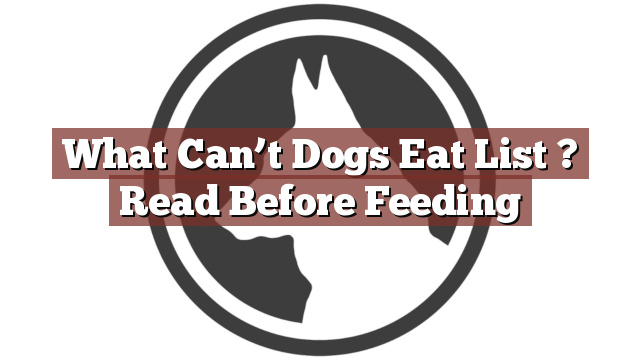Understanding Your Dog’s Dietary Needs
As pet owners, it is crucial to understand the dietary needs of our dogs in order to ensure their health and well-being. While dogs are known to be omnivores, meaning they can consume a wide variety of foods, it is important to remember that not all foods are safe for them. Dogs have different digestive systems and metabolisms compared to humans, which means certain foods that are harmless to us can be toxic or even life-threatening for them.
What Can’t Dogs Eat List? Read Before Feeding
It is essential to be aware of the foods that are potentially harmful to dogs, as feeding them the wrong foods can lead to serious health issues. Can dogs eat chocolate? No, chocolate contains theobromine, a compound that dogs cannot metabolize effectively, leading to symptoms such as vomiting, diarrhea, increased heart rate, and even seizures. Can dogs eat grapes? No, grapes and raisins can cause kidney failure in dogs, which can be fatal. Can dogs eat onions and garlic? No, these foods contain compounds that can damage a dog’s red blood cells and lead to anemia. Other foods that should be avoided include avocados, alcohol, caffeine, and xylitol (an artificial sweetener).
Pros and Cons of Feeding Restricted Foods to Dogs
While it is important to educate ourselves about the foods that dogs should not eat, it is also crucial to consider the potential consequences of feeding them these restricted foods. Some pet owners may argue that their dogs have consumed small amounts of these foods without any adverse effects. However, it is important to remember that the severity of the reaction can vary from dog to dog.
Although some foods may not cause immediate harm, long-term consumption can lead to cumulative effects and could potentially result in chronic health conditions. Therefore, it is best to err on the side of caution and avoid feeding your dog any foods from the "can’t eat" list. Instead, focus on providing them with a balanced diet that meets their specific nutritional needs.
Conclusion: Prioritizing Your Dog’s Health and Safety
In conclusion, understanding the dietary needs of our dogs is crucial for their overall health and well-being. While there are numerous foods that dogs can safely consume, it is essential to be aware of the foods that dogs cannot eat. By avoiding these restricted foods, we can ensure that our furry companions remain healthy and safe. Remember, when it comes to your dog’s diet, it is always better to be safe than sorry. Consult with your veterinarian if you have any concerns or questions about what is safe to feed your dog.
Thank you for taking the time to read through our exploration of [page_title]. As every dog lover knows, our furry friends have unique dietary needs and responses, often varying from one canine to another. This is why it's paramount to approach any changes in their diet with caution and knowledge.
Before introducing any new treats or making alterations to your dog's diet based on our insights, it's crucial to consult with a veterinarian about [page_title]. Their expertise ensures that the choices you make are well-suited to your particular pet's health and well-being.
Even seemingly harmless foods can sometimes lead to allergic reactions or digestive issues, which is why monitoring your dog after introducing any new food item is essential.
The content provided here on [page_title] is crafted with care, thorough research, and a genuine love for dogs. Nevertheless, it serves as a general guideline and should not be considered a substitute for professional veterinary advice.
Always prioritize the expert insights of your veterinarian, and remember that the health and happiness of your furry companion come first.
May your journey with your pet continue to be filled with joy, love, and safe culinary adventures. Happy reading, and even happier snacking for your canine friend!

